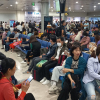Whether they return home or stay abroad, Vietnamese graduates of foreign schools often have difficulty finding their place.
For several months since she graduated with a marketing degree from a university in Canada, Thanh Thao, 26, has not been able to find a job on her chosen career path.
Thao said international students like her regularly learn the hard way that recruiters abroad tend to favor local employment candidates.
“It’s quite hard to find a job. And I could not find satisfying work that matches my qualifications.”
According to Thao, each foreign postgraduate faces competition from 100 local applicants.
“And recruiters prefer locals because they believe people from here can do a better job thanks to their language proficiency and better understanding of the country’s culture and habits,” she said.
In order to extend her stay in Canada, Thao has had to take jobs outside her industry, and she even took on unpaid volunteer work at a non-profit organizations for three months.
“I am employed for now, but I work in a warehouse and take care of logistics for a company,” she said.
In Australia, Thien Kim has been in the same situation.
Despite her master’s degree in communications, Kim said she’s found it difficult to compete for jobs with local applicants.
“In marketing, there is the ‘insight’ concept, which means a deep understanding of consumers, customers, competitors, and the industry. I’m an international student who hasn’t lived here very many years. My culture and thinking are completely different despite how proficient my English is, so there is no way I can understand target customer bases and the market as well as locals here,” Kim said.
“If I want a job developing marketing campaign ideas for a brand, I have to return to Vietnam. If I stay, I will have to accept jobs I don’t want, such as studying the market, building media plans, and other jobs related to technology and numbers instead of working with people and ideas.”
Kim said many of her friends who are also Vietnamese post-graduates in Australia have had to accept salaries lower than market rates because local companies know foreign graduates need jobs to extend their visas.
In October, Australian public policy think tank Grattan released a report titled “Graduates in limbo: International student visa pathways.” The report stated that Australian employers are reluctant to hire international graduates because of uncertainties regarding visas once their Temporary Graduate visas expire.
The Grattan research also reported that many temporary graduate visa-holders struggle to pursue their chosen careers in Australia and thus resort to working low-skilled jobs instead, and only 55% end up working full-time.
 |
|
A group of Vietnamese students take photos with their friends and teachers at a university in Australia. Photo by Dinh Phuong |
The report said temporary graduate visa-holders on average earned less than working holiday-makers, at an average of AUD$56,300 (US$37,437) in 2021 compared to an average of $56,600 among working holiday-makers.
In total, nearly 75% of temporary graduate visa-holders earned less than the median Australian worker in 2021. The median Australian worker earned $63,041 in 2021, which includes many part-time workers
And according to a 2022 report by American biweekly magazine The Nation, 77% of international students expressed the intent to remain in the U.S. and work after the conclusion of their optional practical training. However, only 46% were able to do so.
The report also quoted a survey by Interstride, a platform that supports international students pursuing higher education, as saying that “most international students in the U.S. want to stay after graduation but worry about getting a job.”
Should I stay or go?
Thao said her family has more than once advised her to return to Vietnam, but the fear of reverse culture shock has kept her from doing so.
Thao said she is not alone: many friends of hers who are also overseas Vietnamese students feel the same way after spending years of their youth in another country, during which time they did not just study but also learned to adapt to a new environment, new culture and new habits.
“I got acquainted with the living and working environment here, and I have also gotten used to the way people think and act. I now have the feeling that I would have to start all over again if I return to Vietnam,” she said.
“What I have learned here doesn’t apply in Vietnam. So, I’m quite lost now.”
Thao said she also worries about salary because learning abroad and having several years of work experience in Canada does not mean she would be paid higher than an intern in Vietnam.
“I’ve been considering that option [returning to Vietnam] for a month now, but I think I’ll visit my family first to see if I should move back to live and work,” she said.
Thien Kim, the overseas student in Australia, said the increasing trend of studying abroad was one of the reasons it has been more difficult for international students to return home and find a job.
She said any family that can afford it now sends their children abroad to study, therefore degrees from a foreign university are not as valuable and rare as they were in the past.
The Vietnam Ministry of Education and Training announced early this month that around 40,000 Vietnamese go abroad to study each year, a 2.5-fold increase compared to before 2013.
Education expert Vu Thu Huong said parents should be careful not to pressure their children to study abroad “at any cost.”
“There have been cases in which a bright and confident kid has become depressed when they can’t fit into the new environment of a foreign country, and then they also don’t feel they belong when they return to their home country.”
 |
|
A representative of a American university (L) talks to a student at an education fair in Hanoi, October 2022. Photo by VnExpress/Binh Minh |
According to Huong, some parents pour all their money into sending their children abroad, and then they place unrealistic expectations on what it’s like to settle there after graduation.
“For these students, instead of enjoying and exploring, all they care about is how to take more part-time jobs [to help their parents pay off debts they have incurred sending them abroad] and how to get a ticket to stay.”
She said that some Vietnamese learners abroad find it so hard to stay that they enter fake marriages with locals in order to do so.
Huong suggested that parents speak honestly with their children when they are old enough to see if they really want to study abroad. If they do, she said, it’s then the parents’ job to carefully prepare their children.
She also said families should map out a specific post-graduation plan before a child is sent away.
As for graduates that now feel stuck, Huong suggested they try other job markets, including other countries in the region, or other cities and provinces outside the localities they studied in.
Learning from the experiences of others, Bao Quyen, 26, who studied International Business at a university in Germany, has registered for an exchange course with a Vietnamese university to return home and learn in Vietnam as an international student for one year.
Quyen said this way, she can gradually re-adapt to the Vietnamese environment and establish more connections for more job opportunities.
- Reduce Hair Loss with PURA D’OR Gold Label Shampoo
- Castor Oil Has Made a “Huge” Difference With Hair and Brow Growth
- Excessive hair loss in men: Signs of illness that cannot be subjective
- Dịch Vụ SEO Website ở Los Angeles, CA: đưa trang web doanh nghiệp bạn lên top Google
- Nails Salon Sierra Madre
 VnExpress News The News Gateway of Vietnam
VnExpress News The News Gateway of Vietnam




